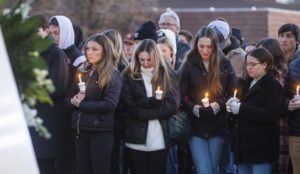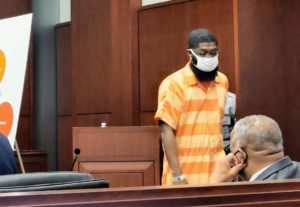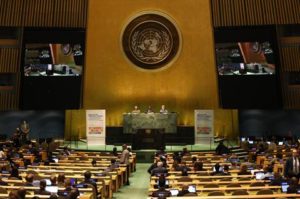Choosing to forgive can be frightening, but it’s a powerful tool for repairing the harm done by violence, oppression and other traumas.
By Pumla Gobodo-Madikizela
Pumla Gobodo-Madikizela is a professor of psychology and the 2024 Templeton Prize laureate.
This essay is part of a series called The Big Ideas, in which writers respond to a single question: What do we fear? You can read more by visiting The Big Ideas series page.
In the years I served on South Africa’s Truth and Reconciliation Commission, I came to a surprising conclusion. It crystallized when I invited the daughter of an anti-apartheid activist to the University of the Free State in Bloemfontein, where I held an endowed chair position, to speak about her encounter with the man who killed her mother. Marcia Khoza was 5 years old when her mother was murdered in a raid led by Eugene de Kock, the former head of the apartheid government’s covert hit squad operations. On the 23rd anniversary of her mother’s death, Khoza went to see de Kock in prison, carrying a book on forgiveness that she bought for him. Inside the book she wrote: “Let the power of peace and forgiveness guide you.”
At the University of the Free State event, Khoza described growing up with a deepening void of emptiness. “I carried so much anger,” she said, and she let the anger intensify to protect herself “from falling into the abyss.” She wanted to meet de Kock to fill the gaps of unanswered questions about her mother’s killing, and as part of her search for inner peace, she was ready to forgive him.
When I joined the commission, it seemed counterintuitive that meeting someone who has murdered a loved one could be restorative for either person. But forgiveness, I came to realize, is perhaps the most powerful means of restoring a sense of coherence and continuity in the lives of survivors of historical wrongs. It can also be an incredibly frightening concept to embrace.
Forgiveness emerges from both within and outside the place of hurt, and it requires a degree of intentional openness, of reaching out beyond oneself toward the other. Therein lies both its transformative potential and its moral ambiguity — and this is what is most frightening about forgiveness. The inward psychological journey necessary before we can forgive enables us to see the humanity of those responsible for our wounding, and, having forgiven them, admit them into our world of common humanity.
Are we then afraid of what forgiveness might reveal about ourselves — afraid that forgiving might confront us with the essence of our identity, our capacity for compassion even in the face of deeds that defy comprehension? Are we afraid that forgiving might be an act of betrayal, drawing us into community with people who have committed terrible deeds against us and against our loved ones? Perhaps our fear of forgiveness reflects a deep-seated anxiety that, by letting go of our resentment of the offenders, we might forget to remember the suffering that befell our loved ones. Maybe we are afraid of losing our identity of victimhood and the power it bestows on us. Maybe the thing we fear most is that by forgiving, we might be relinquishing our power and giving it to the recipient of our forgiveness. Or do we fear the uncertainty of what might come after forgiving — could forgiving simply condone what happened, throwing the hope of reconciliation into chaos? Is it thus easier to cling to the familiar terrain of violence and dehumanization instead of creating conditions that might foster human bonds with others?
Far from being a burdensome act of moral sacrifice, forgiveness may be deeply restorative. I have come to realize that the conditions from which forgiveness unfolds matter more than the act of forgiving itself. The psychological and moral flexibility required for a forgiving gesture — even when one’s internal compass points in the opposite direction and the offender seems undeserving — is precisely what prepares us to imagine a reality in which we begin to heal. It also helps us consider the journey of the person we’re forgiving.
The concept of forgiveness tends to shine the spotlight only on the one who forgives. Yet to be meaningful in contexts emerging from violent histories, the significance of forgiveness lies in our imagination of shared new futures. This means that survivors of historical wrongs are not the only people who may be confronted with fear when thinking about forgiveness. What might perpetrators of human rights crimes and those who benefited from them be afraid of? Perhaps a survivor’s forgiving gesture will force their perpetrators to face the moral truth of their crimes. It is the fear of staring into the abyss of that darkness, realizing that forgiveness may unravel the very fabric of their identity.
In my work on research and dialogue with perpetrators of gross human rights crimes in South Africa, I once invited a former anti-apartheid activist to my class who had been forgiven by the mother of the victim whose murder he was involved in. The activist was embraced by the victim’s family and he even established a friendly relationship with them. At some point, however, the young man broke off the relationship and joined his peers in hijacking cars and stealing cash. The family of the victim sought him out and supported his efforts to rebuild a life of responsible citizenship. It is ironic that sometimes the burden may fall on the surviving family of a victim to create pathways for the offender to leave crime behind and become a moral agent in their community of fellow humans.
The memory of tragic histories of violence and oppression lives on in descendants of both victims and perpetrators. Forgiveness matters, but what matter more are the cumulative, sometimes subtle and ever so imperceptible dynamics that play out in these encounters of reckoning with the past. Perhaps what we fear is the word “forgiveness” itself. It seems to suggest a fixed position or an ending, evoking the act of leaving something behind, moving on without looking back. Yet what brought about the rupture must be mourned. Forgiving stands as the opening of a new chapter, not its closure — the beginning of the journey toward repair.
Pumla Gobodo-Madikizela, the 2024 Templeton Prize laureate, is a professor at Stellenbosch University where she holds the South African National Research Foundation’s Research Chair in Violent Histories and Transgenerational Trauma. Her book, “A Human Being Died that Night: A South African Story of Forgiveness” has been reprinted as a Mariner classic.




